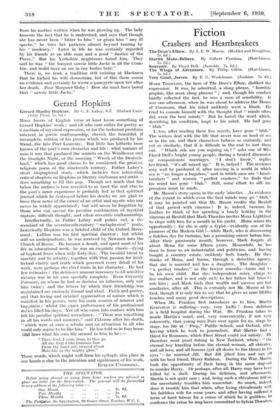Gerard Hopkins
MOST lovers of English verse at least know something of Gerard Hopkins' work ; and all who care either for poetry as a medium of mystical expression, or for the technical problems inherent in poetic craftsmanship, cherish the beautiful, if incomplete, edition of his poems which was produced by his friend, the late Poet Laureate. But little has hitherto been known of the poet's own character and life : what manner of man it was that produced the sonnets on the Windhover and the Starlight Night, or the amazing "Wreck of the Deutsch- land," which has good claims to be considered the greatest religious poem of the nineteenth century. Father Lahey's short biographical study—which includes two interesting critical chapters on Hopkins as literary craftsman and artist— does something to fill this gap. Though not much that lies below the surface is here revealed to us (and the real clue to the poet's inner experience is probably lost in that spiritual journal which he destroyed before his death) we are glad to have these notes of the career of an artist and mystic who can never be widely appreciated ; but will never be forgotten by those who can savour his peculiar combination of mystical rapture, dillicult thought, and often eccentric craftsmanship.
Intellectually, as Father Lahey well points out, a de- scendant of the seventeenth-century " metaphysical " poets, historically Hopkins was a belated child of the Oxford Move- ment. Liddon was his first spiritual director ; but whilst still an undergraduate, he was received by Newman into the Church of Rome. He became a Jesuit, and spent most of his life in educational work—he was an exquisite classic—dying of typhoid fever when only forty-five. The twofold trend to sanctity and to artistry, together with that passion for intel- lectual clarity and truth which governed every detail of his work, were perhaps the chief traits in his character. Ile had few intimates : the defensive armour necessary to all Sensitive natures was in his case specially complete. Even Coventry Patmore, on whom he had so decisive an influence, only saw him twice ; and the letters by which their friendship was maintained are curiously formal -and aloof. Faith and poetry, and that loving and detailed appreciation of nature which is manifest in his poems, were his main sources of interest and happiness : whilst the exact performance of his professional duties filled his days. Yet all who came into contact with him felt his peculiar spiritual ascendancy. "There was something in all his words and manners," said Patmore after his death, "which were at once a rebuke and an attraction to all who could only aspire to be like him." He has told us in four beau- tiful lines what his own life seemed to him to be :— "Thee, God, I come from, to thee go All day long I like fountain flow From thy hand out, swayed about Mote-like in thy mighty glow."
These words, which might well form his epitaph, also place in Our hands a clue to the intention and significance of Isis work.
EVELYN UNDERHILL.






























 Previous page
Previous page